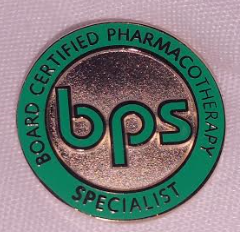There has been growing interest in pharmacist board certification. I think it will only be increasing as the job market seems to be tightening up. Another reason for the increase might be the steady progression toward provider status.
I’m not going to discuss the value of board certifications in the post, but I’ve been asked by several pharmacists; which one should I try to obtain?
There are a lot of board certifications now available for pharmacists. Pharmacotherapy, Ambulatory Care (BCACP), Geriatrics, Oncology, Pediatrics, Psych, etc. I can’t exactly tell you which one is right for you, but I can tell you my thought process in deciding to become a Certified Geriatric Pharmacist (CGP) and Board Certified Pharmacotherapy Specialist (BCPS).
I took my CGP exam a few years back now and don’t regret it. I work primarily in geriatrics and the certification made a lot of sense given a significant amount of my work as a clinical pharmacist was done in long term care (heavily geriatrics). If you are looking for study materials for the CGP pharmacy exam, I’ve created a mock exam you can find here.
Why did I do BCPS? I view BCPS as the most universal certification. The topics covered in this certification are extensive and include everything from pediatrics, critical care, geriatrics, ambulatory care etc. I want to fully disclose that I do have a BCPS mock exam for sale on this website, however, I took the BCPS exam long before I ever considered creating a practice exam. For your reference, per accp.com, about 14,000 pharmacists have BCPS certification. About 1,500 have ambulatory care and oncology respectively, the next two most popular certifications from BPS.
My take: If you know 100% you want to practice in a particular area/specialty of pharmacy for the rest of your career, then doing a specific certification like oncology makes a lot of sense. If you are not exactly sure where your career path will take you as many younger pharmacist are not, I would probably recommend the BCPS certification. Feel free to add your two cents!
New to the blog? Please subscribe to get free clinical medication content!
Eric Christianson, PharmD, CGP, BCPS



I was going to do this years ago but got an MBA instead. I figured it would be interesting and it didn’t expire. Eric, you are tempting me but it’s such a huge commitment in time and money (even with your prep materials) it’s tough.
It is challenging for sure! Out of curiosity, How much work is involved for MBA?
Hi Mel,
I am tempted as well. I wonder if we can make a study group for the fall exam?
Gagan
I want to take this exam.. please guide me.. im from Pakistan..
Regards, RPh. Ramla
I am curious to hear more about CGP… what are the costs associated with it (do you have to be a member of ASCP, re-certification materials [or can you just take an exam again in a few years like BCPS], what qualifications do you need to sit for CGP, etc)? What does CGP provide you that other certifications do not? Board certification is definitely an interesting area and hopefully it will get cleaned up soon. I really don’t think passing a 200-question, multiple-choice exam qualifies you as an effective pharmacotherapy expert; but I don’t have a feasible idea to replace the current set up.
I am doing an EM residency in Arizona, plenty of interaction with acutely ill geriatric patients. Just not sure what CGP will add to my practice (given I already did BCPS) and since you have both I’d like to hear your thoughts.
I’ve seen many long term care/geriatric type positions looking for a CGP. Would I have taken CGP if I did BCPS? That is a tough question! My CGP will expire here in the next year or two and I plan to renew it for whatever that’s worth? Of both exams, the CGP was significantly easier, but I also have to state that I work primarily in geriatrics every day…so it should be easier. CGP is a little more ambulatory focused as well, which is a nice fit for what I’ve been doing with LTC, assisted livings, MTM etc. Hope that helps…
do you have CGP handout from boot camp for sale?
Unfortunately I do not…I am creating some content for CGP however (currently working on a mock exam; shooting for 150 question practice question resource by about September sometime?) Thanks for the message!
Eric
I don’t have any residency, but I’ve been working at retail and recently ambulatory setting. Will I be qualified for BPS in pharmacotherapy?
If you meet these requirements, you should qualify
Graduation from a pharmacy program accredited by the Accreditation Council for Pharmacy Education (ACPE) or a program outside the U.S. that qualifies the individual to practice in the jurisdiction.
A current, active license to practice pharmacy in the U.S. or another jurisdiction.
Completion of three (3) years of practice experience** (post-pharmacist licensure) with at least 50% of time spent in pharmacotherapy activities as defined by the Pharmacotherapy Content Outline.
Content outline found here: https://www.bpsweb.org/wp-content/uploads/bps-specialties/pharmacotherapy/pharma_fall.pdf